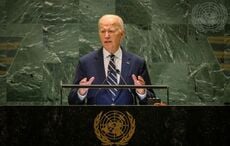(Irish-born Yvonne Watterson recently lost her husband back in Arizona while she was on a family trip home. She writes about coping with loss and her own fond memories of better days.)
It is the shortest day of the year, when the sun will pause for a moment of solstice before changing direction to move northward. From the Latin, solstitium, the apparent standing still of the sun, the Winter Solstice is a turning point. At Newgrange, a neolithic burial tomb even older than Stonehenge, outside Dublin they hold a lottery to decide who will get to experience the solstice the way it was intended by those ancient people who built it over 5,000 years ago. In its roof, is a little opening, aligned to the rising sun. When that sunbeam shoots through the roof-box, it illuminates the chamber below for seventeen minutes. It is a magic time, designed before clocks and calendars, signifying the turn towards a new year.
I’m not ready for it, for days that stretch out even longer than each of the thirty-six that have passed since the day my husband died. Thirty-six. I cannot bring myself to convert those days to weeks or to say it’s been over a month already. I’m not ready, not equipped to turn away from a life with him to one without him, even though the bank is clamoring for a certified copy of the death certificate so they can erase his name from the checking account and the mortgage, make things that used to be “ours” all mine.
From the outside, our house – my house – glitters like a Christmas card with its tree twinkling in the window and a sign for Santa to please stop here. It’s no different than any other year, except everything in it has changed. In a pile on the kitchen countertop, sympathy cards mingle with utility bills and an accidental Christmas card from someone far away who didn’t find out until after she’d mailed it that Ken is dead. Recorded on the DVR are the unwatched episodes of “Alaska: The Last Frontier” and “The Daily Show” scheduled indefinitely. When he died, the television was on and tuned to the Comedy Channel. He would have appreciated the irony. There are the movies he never deleted, like “No Country for Old Men,” probably his favorite after “Goodfellas.” Sophie made me watch it with her last week, fast forwarding to his favorite scenes and explaining the significance of each. I can imagine him telling me that he told me so – it really is a good movie. How come I never watched it with him?
Most mornings now, I get in the car and play a guessing game before turning on the radio. Even Sophie's playing along. We'll look at each other in disbelief when a song he loved comes on.
Again. Never, in our twenty-two years together, did his favorite tunes get such airplay. Even John Hiatt's "Slow Turning" came on the other day (see below). I know Ken would have turned it up loud and stayed in the car until it was over. And he would have been mad if he'd missed his favorite line:
I’m yelling at the kids in the back, ‘cause they’re banging like Charlie Watts.
Naturally, I think there's a conspiracy at work. It reminds me of how it wasn’t until I was diagnosed with cancer that I noticed all the pink ribbons and so many women with bandanas covering vulnerable, shorn heads.
I remember reading something about a woman who felt she had two distinct lives – the one before cancer and the one forever changed by the diagnosis - a turning point, by any other name. When I close my eyes to remember my own diagnosis, I can see myself get up and walk out the door, leaving behind the woman I used to be, offended by the nerve of that Breast Cancer Navigator telling my husband and me that I had cancer. Me? With cancer? Like an unexpected snow, the pronouncement fell from her lips and rendered me wordless.
I remember how she spoke. She was conspiratorial and quiet, talking to my husband in a way that reminded me of the way we quietly speculate about the cause of a death when all the evidence points to hard living. On and on she talked, as if trying to soothe us even as she filled our ears with fear. So many scary words. Not to worry. She stressed that what we were hearing that day in her dimly lit office was not a death sentence.
Nonetheless, I heard a crack. The sound of a life altered that would have me pondering still and more how to handle poet Muriel Rukeyser’s question:
"What would happen if one woman told the truth about her life? The world would split open.
I think it might."
I raged silently against cancer, indignant that it had barged into our lives, interrupting our plans to celebrate our daughter’s fourteenth birthday and Christmas. But we celebrated anyway. We decorated the house the way we always do. We had a party for Sophie. We remembered to laugh. We went to the Bob Seger concert on Christmas Eve. We scheduled the appointments, the blood-work and the biopsies, the mammograms and the mastectomy. The healing began. Sort of.
And then, another Christmas, the cancer contained, the promise of a better year. Relieved and ready to celebrate anything, my parents came to Arizona to help us bring in 2013. We set off fireworks saved for a special occasion and for good luck, we designated my dark-haired husband “the first footer” after midnight. Oh, such sweet relief to shut the door against 2012, a year that had skulked in and scared us, each of us terrified by the cancer and what it might do.
For me - and the woman I used to be - cancer became The Scariest Thing in my life. Like every scary thing that comes to fruition, it had never previously crossed my mind. No. My mind was too consumed with all the things that most likely will never happen. All that worrying. Why? It is such a waste. But the cancer did happen, and I wanted everyone to feel as sorry for me as I did for myself and howl about the unfairness of it all. I wanted sympathy. I even wanted the kind you get from an Irish mammy over endless cups of tea with reminders that there's always someone worse off. Always.
I remember my mother cursing the cancer for the thief that it is, but she'd temper her remarks with reminders that I was so lucky to be married to the best man in the world. “You could set your watch by him!” she’d say, and then she’d jokingly ask him how in the name of God he had put up with me for over twenty years. Not known for my punctuality or having a place for everything and everything in its place, she regularly wondered aloud how I would ever manage without him since he waited on me hand and foot. Without him. In our house. Now that would be a scary thing. Me? A widow?
But in the wee hours of 2013 on a magical New Year’s Eve, I was still Ken’s wife, one half of an “us,” and I was looking ahead and happy. Like mischievous kids, we set off fireworks at the end of our street. My parents’ faces illuminated by sparklers bought one July 4th in San Luis Obispo, my daughter toasting us with cider that shone in one of the good Waterford crystal glasses, it was a magic time, and I remember thinking, “all is well.”
When everyone went to bed on January 1, 2013, I stayed up, savoring the silence of our slumbering house and the opportunity to consider Ted Kooser's bang-on assessment of life, that it is “. . . a long walk forward through the crowded cars of a passenger train, the bright world racing past beyond the windows, people on either side of the aisle, strangers whose stories we never learn, dear friends whose names we long remember and passing acquaintances whose names and faces we take in like a breath and soon breathe away …”
It is just like that. And on this shortest day when the sun stops for a moment, I find myself in between two cars, aware that I still have some distance to travel. Forward. Ready or not. A slow turning. From the inside out.
But there are still so many cars ahead, and the next and the next and the next clatter to clatter to clatter. And we close the door against the wind and find a new year, a club car brightly lit, fresh flowers in vases on the tables, green meadows beyond the windows and lots of people who together — stranger, acquaintance and friend — turn toward you and, smiling broadly, lift their glasses.




Comments